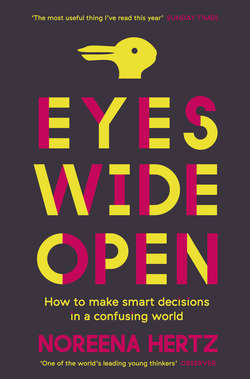Читать книгу Eyes Wide Open: How to Make Smart Decisions in a Confusing World - Noreena Hertz - Страница 34
The Strange Case of Mr Jones
ОглавлениеThere’s another strange human quirk relating to numbers that it is useful to be aware of. We process the same number in different ways, depending on the way it has been presented to us.
You may already know that you’re more likely to buy meat that is labelled ‘85 per cent lean’ than meat labelled ‘15 per cent fat’ (autistic people, interestingly, do not make this common mistake16). But did you know that you are very likely to evaluate fractions differently from percentages?
‘Mr Jones’ would wish this were not so.
When two groups of forensic psychologists and psychiatrists were asked to decide whether to recommend the discharge of a ‘Mr Jones’, a patient at a high-security mental institution, they were given one of two pieces of information on which to make their assessment. The first group was told that ‘Twenty out of every hundred patients similar to Mr Jones are estimated to commit an act of violence against others.’ The second group was informed that ‘Patients similar to Mr Jones are estimated as having a 20 per cent chance of committing an act of violence against others.’
Although these two ratios are of course equivalent, they triggered very different responses. Forty-one per cent of the mental health experts who were given the findings in relative terms (‘twenty out of every hundred’) recommended that the patient should not be discharged, while only 21 per cent of the group who’d been given the information framed in percentage terms did so.
Why should this be? It seems that for many of us there is a distinct difference between the way we perceive fractions and percentages. When we are given numerical information in the form of a frequency – i.e. twenty out of a hundred patients – we see clear, and in this case frightening, images before us. A percentage doesn’t prompt a similarly clear emotional response.17
So, if your doctor tells you that there is a one in ten chance of you having complications from a particular operation, before you freak out, reframe this as a 10 per cent chance. Does that make it sound less bad? And does it therefore impact on your decision whether to have the surgery or not?
